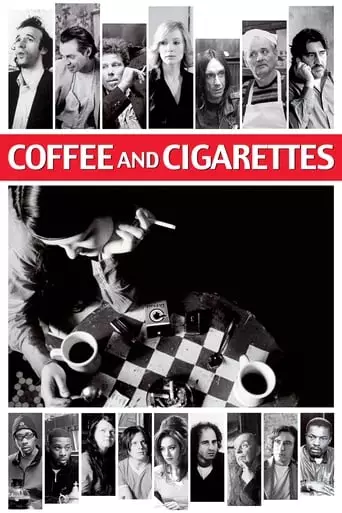
Coffee and Cigarettes (2003) Watch Online Free
Coffee And Cigarettes is a collection of eleven films from cult director Jim Jarmusch. Each film hosts star studded cast of extremely unique individuals who all share the common activities of conversing while drinking coffee and smoking cigarettes.
Coffee and Cigarettes is a 2003 American film directed by Jim Jarmusch, comprising 11 vignettes that explore the nuances of human interaction through conversations over coffee and cigarettes. The film features a diverse ensemble cast, including Bill Murray, Cate Blanchett, Tom Waits, Iggy Pop, and Roberto Benigni, among others. Each segment presents a unique dialogue, often blending humor with existential themes, as characters engage in seemingly trivial yet revealing discussions.
The film’s structure is non-linear, with each vignette standing alone while contributing to an overarching exploration of connection and isolation. The recurring motifs of coffee and cigarettes serve as metaphors for the rituals and habits that define human relationships. Jarmusch’s minimalist approach emphasizes the subtleties of conversation, allowing the characters’ personalities and underlying tensions to emerge organically.
At its core, Coffee and Cigarettes examines the complexities of human relationships. The film portrays characters seeking connection, yet often finding themselves isolated due to misunderstandings, miscommunications, or personal barriers. This theme is evident in segments where characters engage in seemingly mundane conversations that reveal deeper emotional undercurrents.
Jarmusch highlights the ordinariness of daily routines, using the act of sharing coffee and cigarettes as a lens to explore life’s simplicity and monotony. Through these everyday rituals, the film delves into the human condition, reflecting on the small moments that define our existence.
Several segments feature celebrities portraying exaggerated versions of themselves, offering a satirical commentary on fame and identity. These interactions often reveal the dissonance between public personas and private realities, prompting viewers to question the nature of celebrity and the authenticity of personal connections.
The film employs absurdist humor to explore existential themes, using wit and irony to address serious subjects. This approach allows for a lighthearted yet profound examination of life’s complexities, encouraging viewers to find humor in the absurdities of human existence.
Upon its release, Coffee and Cigarettes received generally favorable reviews. Critics praised its unique structure and the depth of its character studies. Roger Ebert described it as a little masterpiece of observation, highlighting the film’s ability to capture the subtleties of human interaction.
The film’s unconventional narrative and minimalist style have since garnered a cult following, solidifying its place as a significant work in independent cinema.
The film’s episodic format offers a refreshing departure from traditional storytelling, allowing for a diverse exploration of characters and themes. Each vignette stands alone, yet collectively they provide a rich tapestry of human experience. This structure encourages viewers to engage with the film in a non-linear fashion, fostering a deeper appreciation for its thematic depth.
Featuring performances by Bill Murray, Cate Blanchett, Tom Waits, Iggy Pop, and Roberto Benigni, the film boasts a talented ensemble that brings its characters to life. The actors’ nuanced portrayals add depth to the film, making each segment compelling and memorable. Their chemistry enhances the authenticity of the interactions, drawing viewers into the narrative.
Coffee and Cigarettes delves into profound existential questions, examining the nature of human connection, identity, and the search for meaning. The film encourages introspection, prompting viewers to reflect on their own relationships and the rituals that define their lives. Its philosophical undertones add a layer of depth that resonates long after the credits roll.
The film’s use of absurdist humor provides a lighthearted yet insightful commentary on life’s complexities. This approach makes the exploration of serious themes more accessible, allowing viewers to engage with the material in a relaxed and enjoyable manner. The humor serves as a vehicle for deeper reflection, making the film both entertaining and thought-provoking.
Jarmusch’s minimalist direction and cinematography focus on character and dialogue, creating an intimate viewing experience. The simplicity of the visuals allows the performances and conversations to take center stage, highlighting the film’s thematic concerns. This style enhances the film’s contemplative mood, inviting viewers to immerse themselves fully in the narrative.
Through its portrayal of celebrities and their interactions, the film offers a satirical look at fame and the entertainment industry. It critiques the superficiality of celebrity culture, providing a nuanced perspective on the human desire for recognition and connection. This commentary adds a layer of social relevance, making the film resonate with contemporary audiences.
Over time, Coffee and Cigarettes has achieved cult status, appreciated for its originality and depth. Its influence can be seen in subsequent films that explore similar themes and employ unconventional storytelling techniques. Watching this film offers insight into the evolution of independent cinema and the creative vision of Jim Jarmusch.
After viewing Coffee and Cigarettes, you may experience a sense of introspection, reflecting on the nature of human connections and the rituals that define our lives. The film’s blend of humor and existential themes encourages contemplation, leaving you with a nuanced understanding of the complexities of daily interactions. The minimalist style and character-driven narrative may evoke a feeling of intimacy, as if you’ve shared a quiet moment with the characters. Overall, the film offers a thought-provoking and engaging experience that lingers beyond the screen.
